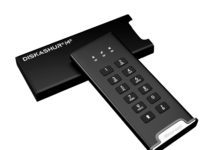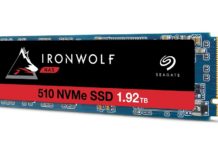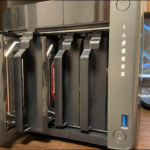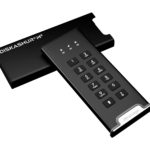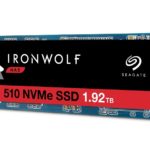When you opt for a more expensive SSD such as Seagate’s new IronWolf Pro 125, you’re largely paying for peace of mind. That is, the premium price reflects a higher endurance rating and heavy overprovisioning, or NAND set aside as replacement. The IronWolf also sports a brand new controller that outperformed any SATA drive I’ve seen. Not by much, but a win is a win.
Design and Features
In form, the IronWolf Pro 125 is a standard 2.5-inch, SATA 6Gbps SSD utilizing 96-layer TLC (Triple-Level Cell/3-bit) NAND. The controller is a new Phison S12DC, hence the bump in model numbers. The non-pro IronWolfs use an older S12.
The drive is available in 240GB ($95), 480GB ($137), 960GB ($263), 1.92TB ($473), and 3.84TB ($945) capacities. Those prices are the suggested retail from Seagate. I found them a bit cheaper at Newegg at the time of this writing.

Designs of similar capacity generally, have the same number of chips and same amount of NAND, given the same number of layers and bits per cell. End-user drives such as the non-pro IronWolf set aside less NAND for replacing worn-out cells and provide 500GB, 1TB, 2TB, etc. or capacity. SSDs that are expected to see heavier workloads set aside more NAND and come in 480GB, 960GB, 1.92TB, etc. flavors.
Seagate’s SeaTools utility won’t let you change the over-provisioning for the IronWolf Pro, which surprised me only slightly. Allowing you to do so could affect the warranty scenario. If you expect a lighter workload and want the extra capacity, the plain IronWolf 125 is a very good drive in its own right.
Note that in my experience, now coming up on the 10-year mark, I’ve had zero SSD failures since very early on, and those were universally due to controller lock up. I’ve never experienced a failure of the NAND, or a drive wearing out in a normal prosumer scenario. Prosumer is the market the IronWolf Pro is aimed at. The company’s Nytro SSDs cover the enterprise.
Warranty, Support, Pro, Non-Pro
Part of the Seagate IronWolf appeal (Pro and non-) is the long 5-year warranty and 3 years of free data recovery provided. As I intimated above, the non-Pro IronWolf SSDs offer lower levels of reassurance with TBW ratings of 700TBW per 500GB rather than the Pro’s 875TBW per 480GB of capacity.
Seagate talks about protection from power loss, which is a combination of tantalum capacitors that the plain IronWolf lacks, as well as a feature of the Phison controller which generates parity recovery info upon initial receipt of data. This means that even data in the cache can be recovered upon the next power up.
As mentioned, the non-Pro version of the IronWolf uses an older Phison S12 controller which touts the same end-to-end protection so it’s not clear if this is a real advantage, or just PR. The only other major difference I could spot is that the IronWolf Pro version draws more power (5 watts/3.92TB) than the non-pro version (2.8 watts/4TB) as well.
Performance
SATA being a bandwidth bottleneck with SSDs, you’ll get largely the same performance out of any modern SSD using that bus. Assuming adequate amounts of cache on board, of course. That said, the IronWolf Pro 125 proved just a touch faster than average. But even a touch faster is better.

The numbers above are a very solid performance, but if you’re more familiar with CrystalDiskMark 6, you can see those results below.

AS SSD, shown below, always produces slightly lower numbers than CrystalDiskMark. The only moderately off-kilter score is the random write access time. However, I’ve only seen as low as 0.18 from this version of AS SSD, so it’s hardly an alarming result–older versions returned much lower numbers.

Note that I did run into one bug with the Seatools software with the main page falsely indicated that an error had occurred with the drive. Run the diagnostics showed no such error existed and Seagate has informed me that the most recent version of the software has fixed this issue.
More Peace of Mind for the Prosumer
As noted, SATA SSD performance, including the IronWolf Pro 125’s, is remarkably similar across the industry. Therefore, data safety, longevity and a company’s guarantee of their SSD are salient factors in your buying decision.
You pay more for the IronWolf Pro 125 than some other drives, but you get more peace of mind. If I were running a high-transaction NAS box for a small business or video studio, this would likely be the drive I’d opt for.




